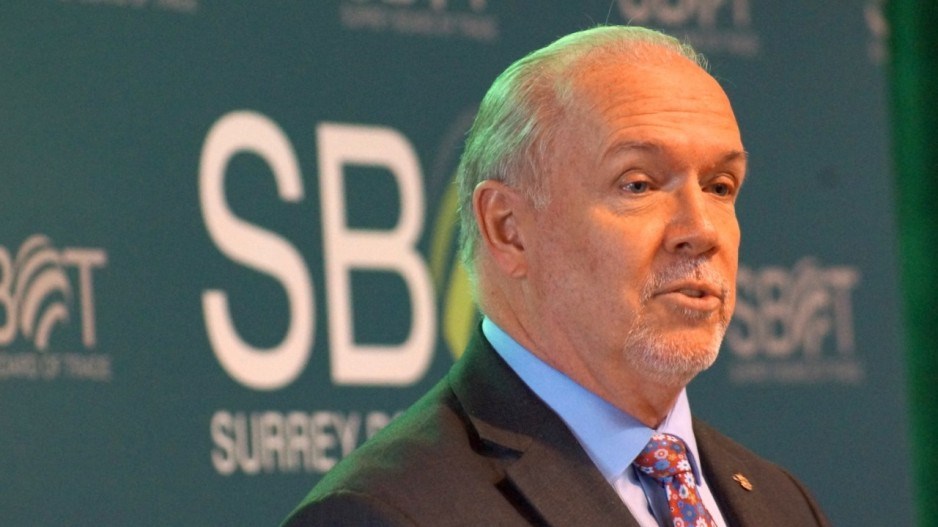With the BC NDP facing vocal special interest groups bent on changing course on contentious policies affecting the city, Premier John Horgan defended his government’s record during a talk at the Surrey Board of Trade Tuesday.
Had Horgan been looking out the window of his large, black SUV upon arrival at Northview Golf and Country Club, he would have seen a dozen members of the Keep the RCMP in Surrey group holding protest signs against the province’s recent approval of the City of Surrey’s plan to transition to a municipal police force.
The group purports to have 42,000-plus signatures from B.C. residents wanting to keep the Mounties in Surrey. The issue has divided the city and the group is pledging to campaign against any Surrey MLA candidate who supports the transition or is non-committal to keeping the Mounties. Their petition was sent to Horgan’s office last month and there has been no formal response to date.
Inside the club Horgan took some audience questions, including from seniors advocacy group CARP, which does not support the police transition.
CARP’s Ramona Kapton asked why Horgan’s government wasn’t following his party’s 2015 “Surrey Accord,” a five-point policy platform to lower crime in Surrey, which includes maintaining adequate staffing of police officers.
Despite adding close to 30,000 residents over the past two years Surrey ciy council has not hired new RCMP officers, citing the transition as the reason.
“Public safety is at risk while this transition takes place,” said Kapton.
Horgan suggested the Surrey Accord was to take effect until Surrey council decided to proceed with transitioning to a municipal force.
“Our expectation was the status quo would prevail … to see how we could implement the Surrey Accord,” said Horgan.
“We have been making modest changes around the edges that was consistent with the accord,” said the Premier, citing more anti-gang program funding. “But I’d be misleading you if I said we didn’t get disrupted from that plan when Surrey council made that choice.”
Kapton reminded Horgan that his government ordered the Victoria Police Department to hire more police officers in February 2019 amid a budget stalemate with Victoria city council. The province’s director of policing has such authority with political approval if it deems public safety is at risk.
“But they [Victoria] weren’t saying they wanted to move to a municipal force from an RCMP force,” said Horgan, saying the Victoria situation was consistent with provincial obligations.
With recent polling showing the BC NDP with no significant lead over the BC Liberals, it is possible Horgan will need to ensure his party maintains control of its six of nine Surrey ridings for his government to hold its razor thin majority via a coalition with the BC Greens. Another hot potato in Surrey is Horgan’s handling of the taxi industry since ride-hailing legislation was introduced last September. When asked by a taxi driver if he will eliminate taxi boundaries to level he playing field with ride hailing companies, Horgan was non-committal but said the Ministry of Transportation is looking at such policies.
“We’re seized of it,” he said, adding additional driver licensing regulations and level-playing field insurance has assisted the taxi companies to date.
Horgan was also challenged by a childcare provider to do more to ensure childcare spaces are adequately staffed. Horgan said raising the minimum wage and creating more early education childcare spaces are some initiatives his government has taken.
Horgan spoke to housing affordability and said the NDP’s demand-side policy measures have helped cool the market but “now we’re starting to see those prices rebound.”
He noted more families are moving to Surrey and suggested in his speech more needs to be done to address growth, including school portables, which are on the rise and not in decline, as once promised by the NDP in opposition.
Horgan touted B.C.’s country-low unemployment rate and balanced budgets set against moderate GDP growth before being asked by Surrey Board of Trade CEO Anita Huberman for his views on taxes and infrastructure.
The board is critical of the new Employers’ Health Tax and wants the threshold for paying it to be 1,000 employees and not 500. Horgan was unrelenting overall, claiming B.C. is merely joining most provinces with such a model, however he said he was open to discussion.
The board has also been pressing the NDP on expanding the new Pattullo Bridge to six-lanes immediately and expediting the George Massey Tunnel replacement, among other South of Fraser transportation priorities.
Horgan’s government was able to balance the budget in part because of the delays it imposed on the Massey crossing, which is to be toll free under the NDP. Horgan mentioned more than once the elimination of tolls on the Port Mann Bridge, a key winning policy for the NDP in Surrey in the 2017 election.
Horgan re-iterated his long-term plan to have Surrey be the Lower Mainland’s next “downtown” and mentioned a favourite pet project of his — planning a Cascadia rapid train line extending from a terminus station in Surrey to Seattle and perhaps Oregon and California.
Horgan did not discuss the environment during his 30-minute speech. Horgan, who has green lighted expanded natural gas fracking, remains accepting of BC Liberal era economic development models such as the Pacific Gateway Strategy but embraced the view that B.C. ought to look south, to the Silicon Valley, just as much, or perhaps more, as it looks across the ocean.
“I do think we need to recognize our strategic location. We should also recognize we are the gateway to the Pacific.”




